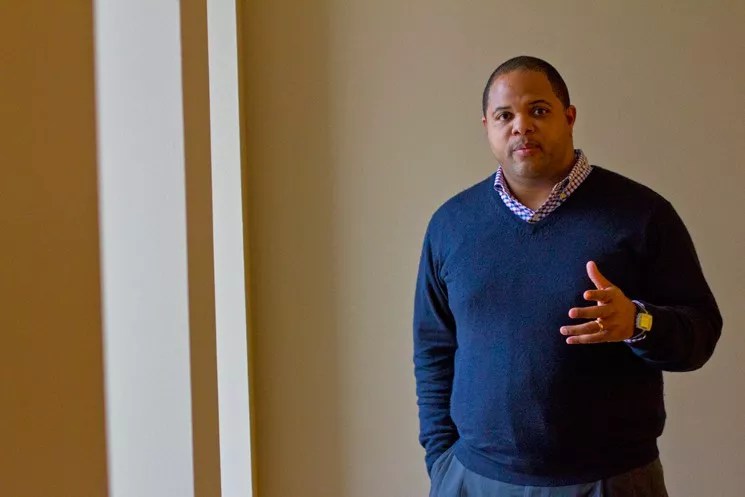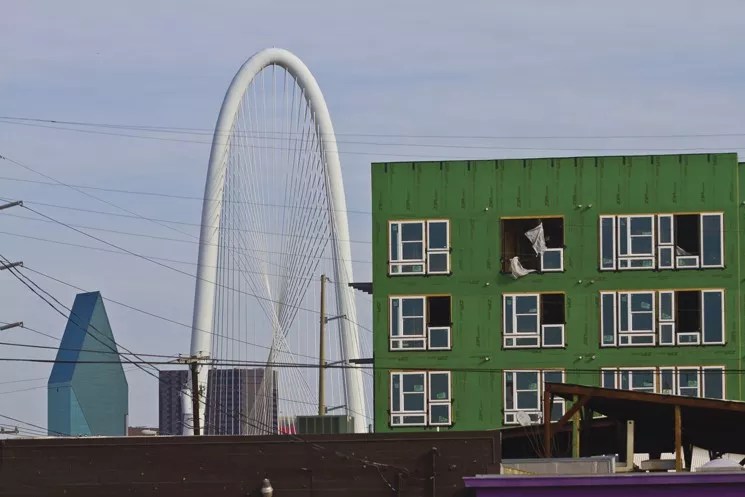
Mark Graham

Audio By Carbonatix
Dallas County Commissioner John Wiley Price, scheduled to go on trial later this month on federal corruption charges, is still king of the city’s old black protesters. But the old black protest machine’s days as a major political force in the city probably are numbered anyway, no matter which way the judge’s gavel falls.
One indicator closely watched by insiders was the selection this week of state Rep. Eric Johnson of District 100 in West Dallas, South Dallas and parts of East Dallas, to head the Dallas Democratic legislative delegation during this year’s session of the Legislature, replacing Rep. Helen Giddings of District 109 in Cedar Hill, DeSoto and Lancaster.
Johnson, who has occupied his seat since 2010, is a standard-bearer for a new and younger element of minority leadership in the city. These new young minority movers and shakers tend to be better educated, more traveled and more sophisticated than their elders. But they are living in the city, as opposed to living in the city’s affluent suburbs where many of them could afford to be, because they are dedicated to the cause of poor minority neighborhoods.
If I had to come up with a one-sentence summary of the ones in that group whom I have met, I would say they are a little tired of hearing the old guard’s war stories and are very impatient for more substantive change.
When I interviewed Johnson recently for a story I was working on about gentrification in West Dallas, he was on fire about the need to do something truly effective to protect poor people threatened with losing their homes to new development:
“I am not against development as a general idea at all,” he said. “I support economic development and community improvement, I do.
“But if you look at that situation in West Dallas right now, you’ve got Trinity Groves, and you’ve got a [special tax subsidy district] that goes from the sports arena to Trinity Groves [at the foot of the Margaret Hunt Hill Bridge].
“So you’ve got a bunch of infrastructure that’s going on just in that part of West Dallas, and then you have the rest of the 75212 ZIP code, everything from there on to Loop 12, where there’s not a dollar being spent on infrastructure. And that’s intentional, I believe, and that’s got to stop.”
It’s a deeper dive into underlying structures that he makes versus what the old protest group was ever able to accomplish. They have tended to demand subsidized housing and contract set-asides. Johnson plunges into the deep inner wiring of the community – the tax measures and special zoning capable of taking land from one group and delivering it to another.
One of his goals for this session is a bill bracketed for Dallas that would require the city to share largesse from the many tax-increment finance or TIF districts the city sets up to deliver hundreds of millions in tax dollars to private developers as subsidy. Johnson wants to see some of that money used to prevent displacement from surrounding areas or at least provide relocation assistance.
“This bill would address requiring an equitable approach to the infrastructure spending in the TIF,” he said. “It would say that in the areas that are directly surrounding or contiguous to a TIF, a certain amount of money has to be spent to invest in infrastructure in those areas.”
He said the bill would target “the census tracts that meet a certain definition of poverty.”
“Any definition of poverty you pick is going to work in the 75212 [West Dallas] ZIP code, which is one of the poorest ZIP codes in the United States.”
Johnson is also focused on recent changes the city made to its Minimum Urban Rehabilitation Standards, called “Chapter 27,” not because he opposes higher standards but because he opposes passing any new law without looking ahead to anticipate and deal with unintended consequences. In the case of Chapter 27, the city passed new higher standards last year and then labeled landlords as vipers when they decided to go out of the rental business, doing nothing for the families losing their homes.
Johnson wants to require the city to provide relocation assistance to people who are dispossessed by new city policies: “You can’t enact ordinances like Chapter 27 that you know will create displacement, have no relocation assistance for your citizens and then just go to try to find someone else to blame for the situation.
“The point is,” he says, “that it’s not a good public policy outcome for cities to be able to make these types of changes without any type of provision for the resulting displacement that we all know is going to happen.”
There is a bit of complicated social history, not without irony, in Johnson’s emergence as one of the new young Turks in minority Dallas. Johnson, 41, is a third-generation product of West Dallas, an area considered the poor country cousin to South Dallas when he was growing up, before many black middle and upper class families decamped from South Dallas to neighborhoods farther southwest or to the suburbs. Johnson still attends church in West Dallas.
Johnson’s mother, Alice Johnson, has written a self-published family history, Humble Beginnings, in which she talks about the pride her own parents felt when they were selected to live in a new public housing development in the 1950s. She describes the intimidation that West Dallas kids felt when they first encountered South Dallas children:
“Their parents were doctors, lawyers, educators or business owners. Most lived in an affluent part of Dallas called South Dallas.
“At times I would feel a little out of place around them. They had piano recitals, dance lessons, formal dances, etiquette classes and memberships in clubs such as Jack and Jill. You could be a member only if your parents had ‘professional’ careers.”
West Dallas is still bitterly poor. But now so is the old South Dallas area around Fair Park. Meanwhile, Johnson has turned his own social tables around decidedly. A graduate of Harvard with a law degree from the University of Pennsylvania, he also has a master’s degree from the Woodrow Wilson School of Public and International Affairs at Princeton University.
When he ran for the District 100 House seat in 2010, he was vigorously opposed by the old South Dallas machine, especially by former Dallas City Council member Diane Ragsdale. While Ragsdale, Price and their group tend to have deep undisputed credentials as early civil rights leaders in the city, almost none of them has graduated from college and few have ever had employment outside elective office or some tax-supported community venture. Johnson is a lawyer with a major downtown law firm. By the way, I think he’s on good terms personally with Price.

West Dallas, site of the new Margaret Hunt Hill Bridge and Trinity Groves development, is experiencing fast-paced redevelopment and related displacement of longtime residents.
Mark Graham
Last week before he was named head of the Dallas Democratic delegation, Johnson published a photograph of himself made during a political trip to Mexico a year ago. In it, Johnson is surrounded by heavily armed Mexican federal police. A caption says, “EL BLACKO – en educated black man, your worst nightmare.”
The El Blacko post followed an earlier Facebook post expressing dismay over the Dallas Democratic Party’s decision to appoint a convicted felon to chair a seminar on voter turnout. The felon was former state Rep. Terri Hodge, sent to prison on an IRS charge as part of the Dallas City Hall federal corruption prosecution eight years ago. Johnson took office in 2010 after Hodge, his opponent in a Democratic primary, pleaded guilty to filing a fraudulent tax return, leaving Johnson alone in the field.
I had written often and long about Hodge and voter fraud earlier during her years in the House. My own conclusion after all that work was that Hodge had always operated just within the letter of the law and that the letter of the Texas elections law was stupid and insidious, deliberately written to allow and enable the brokering and selling of votes legally.
But I also think I got what Johnson’s bitter joke was saying last week: In a city increasingly blessed with smart, tough, well-educated young minority leaders, why would the Dallas County Democratic Party have to reach back almost reflexively to the old Price machine hacks every time it looks for a black or brown face?
Yeah. I get that. And it looks like somebody else did, too, because it was only days later that the party dubbed Johnson as its leader for the current legislative session.
All of this is background music for the upcoming Price trial. I hear people – usually white people – saying that a Price conviction will cause a political upheaval in minority Dallas. Most of the people who say that want to see an upheaval, often just because they want to see minority leaders upheaved.
But minority Dallas is upheaving itself quite without reference to this trial. That upheaval won’t necessarily make things easier for white people, depending on the kind of white people we’re talking about. It could easily have the opposite effect. The changes we are seeing are generational and inevitable. Now if we could just get the white upheaval going, we might actually get somewhere.